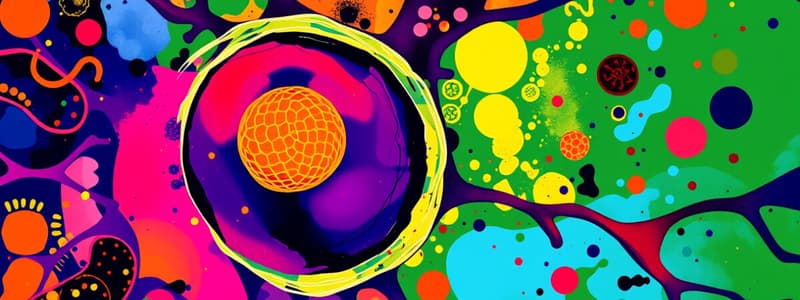Podcast
Questions and Answers
Which statement correctly describes a feature of prokaryotic cells?
Which statement correctly describes a feature of prokaryotic cells?
- They contain membrane-bound organelles.
- They lack a nucleus. (correct)
- They can perform cellular respiration.
- They are larger than eukaryotic cells.
What is the primary function of the mitochondria in eukaryotic cells?
What is the primary function of the mitochondria in eukaryotic cells?
- Store genetic material.
- Synthesize lipids.
- Modify proteins for secretion.
- Produce ATP through cellular respiration. (correct)
During which stage of mitosis do sister chromatids separate and move toward opposite poles of the cell?
During which stage of mitosis do sister chromatids separate and move toward opposite poles of the cell?
- Telophase
- Prophase
- Anaphase (correct)
- Metaphase
Which organelle is primarily responsible for sorting and packaging proteins and lipids?
Which organelle is primarily responsible for sorting and packaging proteins and lipids?
Which process involves breaking down larger molecules into smaller ones?
Which process involves breaking down larger molecules into smaller ones?
Flashcards are hidden until you start studying
Study Notes
Cell Biology Study Notes
Basic Cell Structure
-
Cell Theory:
- All living organisms are composed of cells.
- Cells are the basic unit of life.
- All cells arise from pre-existing cells.
-
Types of Cells:
- Prokaryotic:
- Lack a nucleus.
- Smaller and simpler (e.g., bacteria).
- Eukaryotic:
- Contain a nucleus and organelles.
- Larger and more complex (e.g., plant and animal cells).
- Prokaryotic:
Cell Organelles
-
Nucleus:
- Contains genetic material (DNA).
- Controls cell activities.
-
Mitochondria:
- Powerhouse of the cell.
- Produce ATP through cellular respiration.
-
Ribosomes:
- Site of protein synthesis.
- Can be free-floating or attached to the endoplasmic reticulum.
-
Endoplasmic Reticulum (ER):
- Rough ER: Studded with ribosomes; synthesizes proteins.
- Smooth ER: Lacks ribosomes; synthesizes lipids and detoxifies.
-
Golgi Apparatus:
- Modifies, sorts, and packages proteins and lipids for secretion or use within the cell.
-
Lysosomes:
- Contain digestive enzymes to break down waste and cellular debris.
-
Chloroplasts (in plant cells):
- Site of photosynthesis.
- Contain chlorophyll.
-
Cell Membrane:
- Semi-permeable barrier.
- Regulates the movement of substances in and out of the cell.
Cell Division
-
Mitosis:
- Process of cell division that results in two identical daughter cells.
- Stages: Prophase, Metaphase, Anaphase, Telophase.
-
Meiosis:
- Specialized form of cell division for producing gametes (sperm and egg).
- Results in four non-identical daughter cells with half the chromosome number.
Cellular Metabolism
-
Anabolism:
- Constructive processes where small molecules combine to form larger ones (e.g., protein synthesis).
-
Catabolism:
- Deconstructive processes breaking down larger molecules into smaller ones (e.g., digestion).
Transport Mechanisms
-
Passive Transport:
- Movement of substances across cell membranes without energy input (e.g., diffusion, osmosis).
-
Active Transport:
- Movement of substances against their concentration gradient, requiring energy (e.g., sodium-potassium pump).
Cell Signaling
- Signal Transduction:
- Process by which a cell responds to external signals.
- Involves receptors, second messengers, and effectors.
Cell Specialization
- Differentiation:
- Process by which stem cells develop into specialized cell types.
- Essential for multicellular organisms to perform various functions.
Apoptosis
- Programmed Cell Death:
- Controlled process for eliminating damaged or unnecessary cells.
- Plays a crucial role in development and homeostasis.
Basic Cell Structure
- Cell Theory: Fundamental principle that all living organisms are made of cells, which function as the basic unit of life, and all cells originate from pre-existing cells.
- Types of Cells:
- Prokaryotic: Simpler organisms without a nucleus; typically smaller and include bacteria.
- Eukaryotic: More complex organisms with a nucleus and organelles; examples include plant and animal cells.
Cell Organelles
- Nucleus: Houses DNA, directing cell activities and heredity.
- Mitochondria: Known as the cell’s powerhouse; generates ATP through cellular respiration, vital for energy.
- Ribosomes: Protein synthesis takes place here; they can be found free in the cytoplasm or bound to the endoplasmic reticulum.
- Endoplasmic Reticulum (ER):
- Rough ER: Studded with ribosomes; primarily responsible for protein synthesis.
- Smooth ER: Lacks ribosomes; involved in lipid synthesis and detoxification processes.
- Golgi Apparatus: Modifies, sorts, and packages proteins and lipids for distribution or use within the cell.
- Lysosomes: Contain enzymes for digestion; crucial for breaking down waste and cellular debris.
- Chloroplasts: Unique to plant cells; site of photosynthesis, containing chlorophyll for capturing light energy.
- Cell Membrane: Semi-permeable, selectively regulating the entry and exit of substances in and out of the cell.
Cell Division
- Mitosis: A type of cell division producing two genetically identical daughter cells, consisting of phases: Prophase, Metaphase, Anaphase, and Telophase.
- Meiosis: Specialized division producing gametes (sperm and egg); results in four genetically diverse daughter cells with half the original chromosome number.
Cellular Metabolism
- Anabolism: Biosynthetic pathways where small molecules join to form larger, complex molecules, such as proteins.
- Catabolism: Degradative pathways breaking down larger molecules into smaller units, playing a key role in digestion.
Transport Mechanisms
- Passive Transport: Movement of substances across cell membranes without the expenditure of energy; includes processes like diffusion and osmosis.
- Active Transport: Energy-requiring process that moves substances against their concentration gradient, exemplified by the sodium-potassium pump.
Cell Signaling
- Signal Transduction: Mechanism enabling cells to respond to external stimuli through a series of molecular interactions involving receptors, second messengers, and effectors.
Cell Specialization
- Differentiation: The process whereby stem cells develop into specialized cell types, essential for multicellular organisms to execute diverse functions.
Apoptosis
- Programmed Cell Death: A regulated process for the elimination of damaged or surplus cells, crucial for development and maintaining homeostasis.
Studying That Suits You
Use AI to generate personalized quizzes and flashcards to suit your learning preferences.




